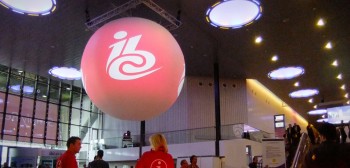This year’s IBC attracted a record 52,000 attendees. During the show we talked to Michael Crimp, CEO of the IBC for the past five years, about trends in 2013 and future directions
Is the IBC international enough, is it becoming more so?
The visitors come from more than 150 different countries, so in that sense it’s very international. One of the reasons we’re in Amsterdam is that it’s a multicultural society that welcomes people from everywhere. The conference covers a range of different topics; on Indian business – Bollywood, then there’s American issues and issues from different parts of the world.
We do ponder sometimes whether it should all be in English. [Translation] would take a long time for 150 countries but if you look where Amsterdam is on the map, we’re strong in northern Europe, and there are lots of different languages there, southern Europe and South America are quite strong, but the biggest contingent from South America would be Brazil, so Spanish and Portuguese, then Chinese maybe [could be priority languages].
 Are there any regions you want to reach more? Anywhere it’s difficult to get people to attend from?
Are there any regions you want to reach more? Anywhere it’s difficult to get people to attend from?
IBC is owned and run by the industry, so the IABM for example, is one of the owners, the SCTE is another. So they tend to run competitions, bursaries or sponsorship training to bring people here. I’m always quite thrilled to meet them because to me sometimes it’s like another big trade show, but for them it’s just an amazing world, being left alone in biggest toy shop in the world, and very often it’s technology which they’re not likely to see or be able to buy.
What have you seen as the biggest standout change in broadcasting this year?
In our leaders summit, where we invite top European CEOs to debate strategic issues, big data and 4K were big issues. It’s interesting that big data is all about personalising the content and the advertising to individuals, which is a one-to-one approach. But 4K is real old-fashioned broadcasting – ‘one to many’. Where the broadcasters are fighting back with this, with 4K and then later 8K, is it’s difficult to see how you can send that to an internet connection. So you’ve got that contrast of big 4K, with the smaller screen and more personalised experience. And I think the theme for the future was how they join up and work together.
Is content becoming more important? Is it covered enough by the conference?
IBC used to be an old-fashioned black box technology show. But if you go to the awards ceremony, you’ll see Peter Jackson [Lord of the Rings director] on screen, and you’ll see some of his work. And we had some big Bollywood people here. [Jackson] was very gracious about encouraging technology, because without it you can’t have the creativity. So content is becoming increasingly important. Important to us, and technology is becoming increasingly important to the filmmakers and TV-makers out there.
What’s IBC Content Everywhere about?
It’s something we’re launching in Dubai, then in Sao Paolo, and we might then take it to Asia. In some countries the economies are growing fast, and there’s a proliferation of connected devices, and consumption of content over IP is huge. So many people are walking around with a smartphone, and you get a different sort of information on a smartphone if you just think about news and social media. So we picked those two markets to have a show which is basically focused on receiving content over IP.
We’re going to build a theatre in each [of the two cities], and there will be the opportunity for exhibitors to talk about what they’re doing, but there’ll also be some purely educational sessions. We’re not looking at charging people to come to a conference, we’re looking at creating an engagement package for the exhibitors and senior broadcast people.
Your thoughts on future directions for the show?
I see us like a big tanker and if we want to change direction, the best thing to do is start gently tilting it around now, not waiting till people start to ask for too much change. An area which gets constantly discussed now and I think will be a big issue for the next year, as it is everywhere, is cloud. There’s a lot of cloud-based stuff already but some companies like to have a heart, an area where they can be which is specifically about that, others don’t. IBC will accommodate it in some way, we’re still having discussions about it.
Read about our IBC bursars:
Bright sheds light on Zambia’s digital plan at the IBC
A driver for the Pacific digital transition roadmap

 WorldView
WorldView Your WorldView
Your WorldView